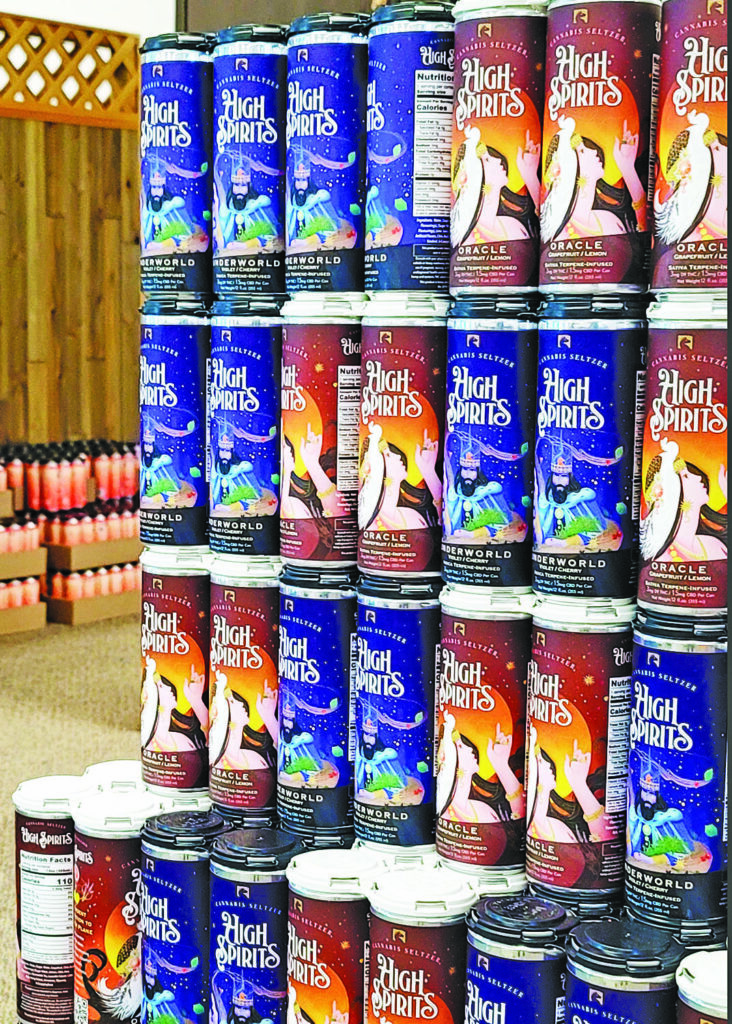moorhead city council

THC-infused seltzers are displayed at Unwind, a new shop specializing in legal THC edibles.
The Moorhead City Council’s first discussion of an ordinance regulating the sale and manufacture of THC-infused edibles ended Monday with a motion to table the measure until a future meeting.
After stating her reservations about the measure – developed by city staff – Ward 1 council member Shelly Dahlquist moved to table the discussion until a later meeting. She cited the absence of two members, Deb White and Steve Lindaas, as the reason to postpone. “I see a lot of problems,” she said.
Sale of edible products containing tetrahydrocannabinol (THC), the active component distilled from hemp that affects mood, became legal July 2 after the 2022 Minnesota Legislature’s approval. The state law includes little guidance on regulation of the newly available products, which cannot contain more than 0.3% THC or 5 mg. of the active ingredient per serving. (That limit does not apply to medical marijuana products.) Sales of the products, always in tamper-proof packaging, are limited to customers over 21. Cities are prohibited from taxing their sale.
City manager Dan Mahli put together a committee to look at local zoning and licensing. Among its members: staff from the police department, city attorney’s and prosecutor’s offices, the city clerk’s and manager’s offices, and the community development department. Their proposed regulations would focus on license standards for sellers of edible products, limit zoning where sales and manufacture can take place, and impose an annual license fee of $125. That is the same amount charged for other city licenses, noted planning director Kristie Leshovsky, including tobacco products, secondhand sales and massages. It would also impose zoning restrictions for selling and manufacturing THC edibles, banning sales from homes, self-service or vending machines and temporary sites like pop-up shops or carts.
Several Moorhead businesses current offer a range of edible beverages and candies, including vape shops and stores specializing in THC and CBD products. The state banned sales in liquor off-sale establishments in August.
Planning director Kristie Leshovsky and Capt. Deric Swenson of the Moorhead Police Department were on hand to answer the council’s questions. While Leshovsky explained the specifics of the proposed local regulation and its interaction with state law, Swenson addressed law enforcement concerns raised by Gilbertson.
The councilman expressed two main concerns – access by those under 21 to THC in the form of tasty gummy candies, and the cost of the proposed city license.
“Flavored vapes are legal, but we just banned their sale in Moorhead because of their obvious appeal to children,” he said, comparing their attractuveness to that of the popular candies. He questioned what measures would be taken to limit the possession of gummies and punish those who transgress.
Swenson replied that today’s law enforcement focuses on education and prevention of misuse of these substances, rather than arresting and punishing violators, whether of alcohol, tobacco, marijuana or other substances. He said while there are no standarduzed field sobriety tests for THC intoxication, impaired driving behavior can be judged by trained observers and confirmed by blood tests similar to those for alcohol, conducted by the Bureau of Criminal Investigation.
Gilbertson suggested he would lean toward supporting the measure if the licensing fee was raised substantially to a level comparable to what the city charges for liquor licenses. “Charging the same as for cigarettes and massages doesn’t make sense,” he said. “You don’t get into a crash because you had a massage, and you can legally smoke a cigarette while you’re driving.”
While he mentioned setting licensing at $3,000, Ward 4 council member Chuck Hendrickson – who agreed with his argument – noted that the current liquor fee is $6,000.
Dahlquist pointed out differences between THC products and other legal sales, including alcohol and other illegal drugs. “You can’t overdose on marijuana,” she said. “These products have been proven to help people with certain conditions.” Yet, she said, enforcement of whatever law is adopted will be challenging for city law enforcement. “We need to discuss this more when all of our council members can participate in person,” she added.
The proposed measure was tabled, to be taken up at a future council meeting.


